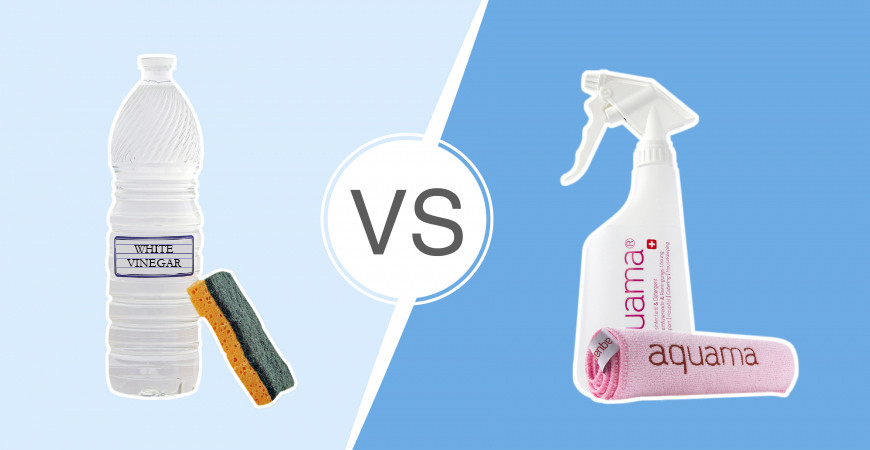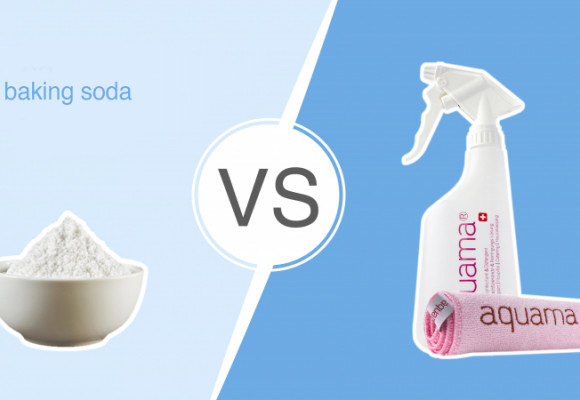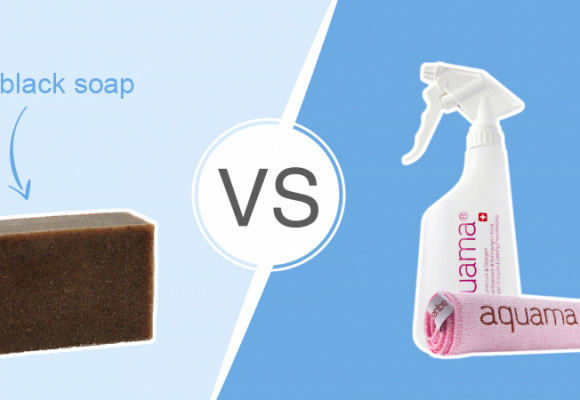Battle #2 - aquama vs white vinegar
Battle #2: aquama vs. white vinegar
Vinegar, baking soda, Marseille soap or lemon juice: we have all heard of these methods of cleaning from our grandmas. But what about their effectiveness? In this new series of articles, we compare them to aquama’s 100% ecological solution!
This week, let’s focus on white vinegar. How does it compare to our 100% biodegradable solution?
The answer is in these 6 points of comparison!
Round 1 - Disinfection
White vinegar: white vinegar has long been used to clean, descale, degrease and deodorize. But when it comes to deep disinfecting and eliminating bacteria, viruses and microorganisms, this one has its limits!
Indeed, it is not standardized for disinfection and does not eliminate mold, unlike aquama®.
aquama®: our solution, obtained from water, salt and electricity through a hydrolysis process, is up to 100 times more powerful than bleach with an equal molecule. Thanks to its antibacterial properties, it neutralizes bacteria, bacilli, salmonella, legionella and mold.
Its main advantage over white vinegar? It combines disinfection, detergency and degreasing in a single solution, which meets European standards for bactericides, fungicides and virucides (EN1276, EN 13697, EN1650 and 14476).
Result: aquama® 1 - white vinegar 0
Round 2 - Corrosivity
White vinegar: contrary to what you might think, white vinegar is not suitable for all surfaces. Due to its acidic pH (about 2.5), its use requires special precautions. In particular, it is not recommended to be used on porous surfaces, such as marble or wood, on the body of a car or on leather.
aquama®: our Indigo solution (whose pH is greater than or equal to 8.5) is alkaline and suitable for all surfaces in your home (parquet, linoleum, carpet, dishes, stainless steel, leather, plastic, cast iron, metal, laminate , wood, glass, mirror, glass ceramic, etc.) In summary: everything that supports water, supports aquama! Professionals and individuals have already testified to the effectiveness of aquama® on bodywork and car interiors. However, we recommend that you test the solution on a small area before cleaning any leather or fabric.
Result: aquama® 2 - white vinegar 0
Round 3 - The smell
White vinegar: The most glaring disadvantage of white vinegar remains the strong and stubborn odor it gives off, which can be bothersome and difficult to mask.
aquama®: aquama® does not contain synthetic fragrances and therefore no volatile organic compounds harmful to health. Only a slight odor of chlorine is released from the spray, but it does not persist during or after cleaning.
Result: aquama® 3 - white vinegar 0
Round 4 - Harmful to health
White vinegar: being a natural ingredient, we wrongly think that white vinegar is harmless to our health. In reality, the acetic acid it contains is a corrosive component, the vapors of which are irritating to the respiratory tract and the eyes.
Beware of mixtures! Combined with other components, vinegar can become dangerous for health:
White vinegar and baking soda: this mixture is not recommended because it produces an effervescent reaction. If it is done in a closed container it could even explode. Be careful ! In addition, contrary to popular belief, the two ingredients have antagonistic properties that cancel each other out. The mixture therefore loses efficiency.
White vinegar and bleach: it might be tempting to want to combine the disinfectant properties of bleach with vinegar. But beware ! The combination of these components produces a toxic gas: chlorine, which can cause burns and serious respiratory problems.
White vinegar and hydrogen peroxide: this mixture creates an oxidizing agent: peracetic acid, very aggressive for the skin, eyes and mucous membranes. Avoid at all costs!
aquama®: tests carried out in the laboratory allow us to certify that aquama® is non-toxic to health (no known danger in contact with skin and eyes, nor in the event of inhalation or ingestion). In addition, it has no danger pictogram!
Result: aquama® 4 - white vinegar 0
Round 5 - The price
White vinegar: commercially, 1 liter of white vinegar costs on average € 0.45. In addition, due to its high concentration of acetic acid, it may require rinsing (in the event of food contact for example). An additional step that requires more water and more time ... not necessarily economical, therefore!
aquama®: aquama® costs you 0.39 € per liter (excluding machine price), which is less expensive than a liter of white vinegar. Unlike the latter, it does not require rinsing. It therefore saves time and money, while being respectful of the environment.
Result: aquama® 5 - white vinegar 0
Round 6 - Descaling
White vinegar remains a very good addition to aquama® for descaling, however.
Our solution does not require rinsing, it limits the deposition of lime on the surfaces. But in the event of lime encrusted or to remove scale which can accumulate on the pitcher of your Freedom® machine, white vinegar is your best ally!
Result: aquama® 5 - white vinegar 1




